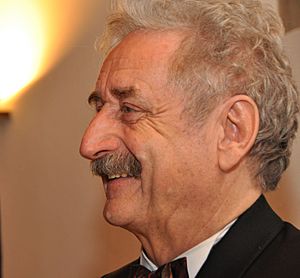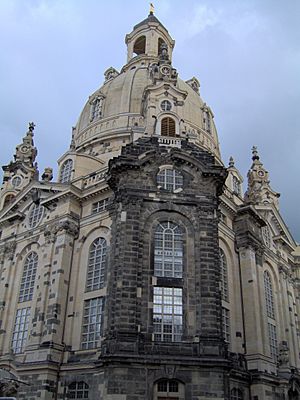Ludwig Güttler facts for kids

Ludwig Güttler (born 13 June 1943) is a very famous German musician. He is a master at playing special trumpets, like the Baroque trumpet and the piccolo trumpet. He also plays the corno da caccia. Besides playing, he is a conductor. He started several music groups, including the Virtuosi Saxoniae orchestra.
Ludwig Güttler has received many important awards. These include "Discovery of the Year" in 1983 and the Frankfurt Music Prize in 1989. He also helped start the Rheingau Musik Festival in Hesse. He has performed there regularly since it began in 1988.

Mr. Güttler was a leader in rebuilding the Dresden Frauenkirche. This famous church was destroyed during World War II. Thanks to his efforts and others, it was rebuilt from 1994 to 2004. For his work, Queen Elizabeth II made him an Officer of the Order of the British Empire (OBE) in November 2007.
Contents
About Ludwig Güttler's Life
Early Life and Musical Journey
Ludwig Güttler was born in 1943 in a town called Sosa. This town is in the Ore Mountains region of Saxony, Germany. He studied music at a special school in Leipzig. His teacher there was Armin Männel.
From 1965 to 1969, he played in an orchestra at the Handel Festival, Halle. Then, from 1969 to 1980, he played with the Dresden Philharmonic. He also taught the trumpet. He taught at the Hochschule für Musik Carl Maria von Weber in Dresden until 1990. He also taught at a music seminar in Weimar from 1980 to 1990.
Playing and Leading Music
Since the mid-1970s, Mr. Güttler has mostly worked as a solo musician. This means he plays by himself or as the main performer. Later, he also became a conductor, leading orchestras. He loves playing trumpet music from the 1700s. He is especially good at playing the high-pitched piccolo trumpet.
He also helped create a modern brass instrument. This instrument was designed to play parts written for the old corno da caccia. A person named Friedbert Syhre in Leipzig made this new instrument.
Mr. Güttler is also the music director for two festivals. One is "Sandstein und Musik" (Sandstone and Music) in Saxon Switzerland. This festival started in 1983. The other is the Musikwoche Hitzacker festival in Hitzacker. He is also a member of the Saxon Academy of Arts.
Leading Musical Groups and Festivals
The Virtuosi Saxoniae Orchestra
Ludwig Güttler started several music groups. In 1976, he founded the Leipziger Bach-Collegium. In 1978, he started the Blechbläserensemble Ludwig Güttler. Then, in 1985, he created the chamber orchestra called Virtuosi Saxoniae.
This orchestra is made up of musicians from the Staatskapelle Dresden. They focus on playing music from the 1700s. They find this music in libraries in Dresden. They perform operas, church music, and chamber music.
Helping the Rheingau Music Festival
Mr. Güttler has supported the Rheingau Musik Festival since it began in 1988. He has performed there many times. He also helped plan the festival's music programs. In 2011, he performed with his Brass Ensemble. In 2012, he led his Virtuosi Saxoniae orchestra at Eberbach Abbey. They played music by famous composers like Bach, Handel, and Mozart.
Awards and Special Honors
In 1983, Ludwig Güttler won a record prize. It was from the Deutsche Phono-Akademie in Hamburg. He was named "Discovery of the Year." In 1988, he received the Georg-Philipp-Telemann-Preis from Magdeburg. In 1989, he won the Frankfurter Musikpreis.
He also received the National Prize of East Germany twice, in 1978 and 1985. However, in 1989, he returned these awards. He asked that the money from them be used to help rebuild the Frauenkirche.
Rebuilding the Dresden Frauenkirche
After Germany became one country again, Ludwig Güttler became very involved with the Dresden Frauenkirche. He became the chairman of the group that helped rebuild it. He also became a curator for the Frauenkirche foundation. He often conducted special "reconstruction concerts" to raise money for the church.
Because of his hard work for the Frauenkirche, he received many honors. In September 2007, President Horst Köhler gave him the Order of Merit of the Federal Republic of Germany. On May 26, 2005, Erich Iltgen gave him the Sächsische Verfassungsmedaille. Queen Elizabeth II also made him an Officer of the Order of the British Empire (OBE) in November 2007. This was to thank him for his efforts in rebuilding the Frauenkirche. It also recognized his important role in bringing people together through this project.

